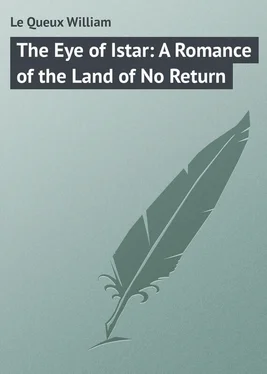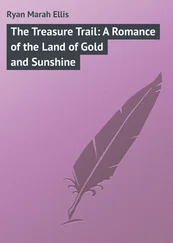William Le Queux - The Eye of Istar - A Romance of the Land of No Return
Здесь есть возможность читать онлайн «William Le Queux - The Eye of Istar - A Romance of the Land of No Return» — ознакомительный отрывок электронной книги совершенно бесплатно, а после прочтения отрывка купить полную версию. В некоторых случаях можно слушать аудио, скачать через торрент в формате fb2 и присутствует краткое содержание. Жанр: Прочие приключения, foreign_prose, на английском языке. Описание произведения, (предисловие) а так же отзывы посетителей доступны на портале библиотеки ЛибКат.
- Название:The Eye of Istar: A Romance of the Land of No Return
- Автор:
- Жанр:
- Год:неизвестен
- ISBN:нет данных
- Рейтинг книги:5 / 5. Голосов: 1
-
Избранное:Добавить в избранное
- Отзывы:
-
Ваша оценка:
- 100
- 1
- 2
- 3
- 4
- 5
The Eye of Istar: A Romance of the Land of No Return: краткое содержание, описание и аннотация
Предлагаем к чтению аннотацию, описание, краткое содержание или предисловие (зависит от того, что написал сам автор книги «The Eye of Istar: A Romance of the Land of No Return»). Если вы не нашли необходимую информацию о книге — напишите в комментариях, мы постараемся отыскать её.
The Eye of Istar: A Romance of the Land of No Return — читать онлайн ознакомительный отрывок
Ниже представлен текст книги, разбитый по страницам. Система сохранения места последней прочитанной страницы, позволяет с удобством читать онлайн бесплатно книгу «The Eye of Istar: A Romance of the Land of No Return», без необходимости каждый раз заново искать на чём Вы остановились. Поставьте закладку, и сможете в любой момент перейти на страницу, на которой закончили чтение.
Интервал:
Закладка:
The caravan, belonging to Abu Talib, a wealthy merchant of Yô, was a small one, consisting of about one hundred camels heavily laden with ivory, kola nuts, spices, and other goods from the far south, destined for the great market at El Fasher, and was guarded by twenty fierce-looking Arabs and a number of negro and Arab drivers, all well-armed, for the country through which we were to pass was infested by the marauding Tuaregs, those black-veiled terrors of the plains, who know nothing of anything but the desert and the implacable sun.
Abu Talib, who accompanied us in person, was an aged, good-hearted man of the tribe of Aulad Hamed, who had spent the greater part of his life trading between In Salah and Timbuktu, or between Yô and Mourkouk, over the boundless Sahara, and in the darkness, as we rode together and our camels with silent tread loomed like phantoms in the midnight air, we told each other of our journeys and adventures. His companions were true sons of the sands, active, vigorous and enterprising, inured to hardships, and with the mental faculties sharpened almost to a preternatural degree by the hard struggle for existence in their arid, rocky homes. In making their way across those trackless solitudes they seemed endowed with that “sense of direction,” the existence of which has recently been discussed by students of psychology. In the whole of the Great Sahara no race is more shrewd or cunning than the Buzawe, and their tact and skill enable them to get the better both of Arabs and negroes in the markets of the oases. Greed and harshness were stamped upon their hard features, but nevertheless they treated me, a lonely wanderer, with considerable kindness.
On leaving Kukawa we passed across a great plain, then through a dense forest, afterwards entering a fine, undulating country, covered with a profusion of herbage, with here and there large gamshi-trees with broad, fleshy leaves of brightest green. The moon shone bright as day, and as our file of camels strode on with slow, rhythmic movement under their burdens, the drivers would now and then sing snatches of wild songs of daring in the Hausa tongue.
Thus, resting by day and journeying by night, we moved forward around the marshy shore of Lake Tsad to Missene, thence through the cool, shady forest of Dekena Kreda, enlivened by many birds, along the densely-populated valleys of Boulala to the strange little town of Amm Chererib situate in the hollow formed between four great mountains, at length, when the moon was again at the full, reaching Abecher, at the foot of the hills of Outoulo, without much exciting incident. Halting for one day under the fortified walls to fill our camels’ kewas with provisions, we again pushed forward unceasingly in order to accomplish the two hundred and fifty miles of barren, waterless land unmercifully scorched and burnt by a devouring sun, that stretches between the capital of Darmaba and El Fasher. This portion of the journey was the most difficult we had encountered, for the rough stones played terrible havoc with the spongy feet of our camels, and the heat was insufferable, even at night, on account of the poison-wind sweeping across us continuously. For five days we pushed forward by short stages only, until at sunrise one day we espied an oasis, and, encamping in the small shade it afforded, Abu Talib decided to give the animals rest. The packs were therefore removed, our tents erected, and having eaten our dakkwa , a dry paste made of pounded Guinea-corn with dates and pepper, washed it down with some giya made of sorghum, we reclined and slept during the warm, drowsy hours of the siesta.
Some noise had awakened me, and lighting my keef-pipe I was squatting in the shadow cast by one of the camel’s packs, deep in my own sad thoughts, when the crack of a rifle startled me. Next second, even before my companions could seize their arms, the whole neighbourhood was alive with yelling Tuaregs on horseback, armed to the teeth, with their draperies floating in the wind. I saw they all wore the black litham about their faces. One, as he advanced on foot, levelled his gun at me and fired, but missed. In a moment I threw myself full length upon the sand behind a camel’s pack, and opened fire upon our enemies. With deliberate aim I had picked off three with as many shots, when suddenly I heard old Abu Talib cry, —
“Lost are we! Our enemies are the Aoulemidens!”
Almost before the words died upon his lips a bullet struck the old man full in the breast; he staggered back and fell, within a few yards of me, a corpse. To resist these fierce outlaws, the most relentless tribe of Tuaregs who lived in the depths of that arid, desolate country, with no knowledge of the outside world, was, we knew, hopeless, for there were fully three hundred of them, and as they found our little band disinclined to surrender, they began shooting us down ruthlessly. Already four of our party had been captured and bound, while three were lying dead, nevertheless our rapid fusillade kept at bay those preparing to dash in and seize our camels’ packs.
Fiercely we fought for life. We knew that if we fell into the hands of this brigandish tribe who called themselves “The Breath of the Wind,” by which their victims were to understand that they might as well seek the wind as hope to recover their stolen property, we should either be sold at the nearest market, or placed under some horrible and fiendish torture to die a slow, agonising death. Suddenly a wild yell rent the air, and before we were aware of it a troop of some fifty horsemen dashed in among us, so quickly that resistance was impossible. Hand-to-hand we struggled, straining every muscle to evade our enemies, but ere long the obstinate, heroic courage of my companions could no longer blind them to the approach of the inevitable, and we were each secured and bound, captives in the hands of the merciless veiled men of the desert, whose fierce brutality was feared alike by slaves and Sultans throughout the sun-parched land.
Our arms were twisted from our grasp, our camels’ packs seized, and, linked together ignominiously by chains around our necks, we were secured to three palm trunks, under a strong guard with loaded rifles, to wait while our captors investigated their booty and reloaded our camels. Nearly two hours this occupied, when at length the grey-bearded, sinister-faced leader of the band of free-booters gave the order to mount, and before long the party, numbering nearly three hundred horsemen armed to the teeth, moved away into the sandy wilderness, compelling us to trudge over the hot, stony ground on foot under the fiery rays of the blazing sun. It was evident that we were to be sold as slaves. One unfortunate camel-driver, who had been wounded, fell from sheer exhaustion within the first hour, and was left to die, for slave-raiders like “The Breath of the Wind” regard the wounded only as an encumbrance, and as they will not sell they are either put out of their misery by a shot, or left to die of thirst and become food for the vultures. Fortunately, with the exception of a slight cut on the left hand received from a jambiyah with which one of my captors had slashed at me, I sustained no injury, and with my companions, a little band of silent, despairing men, I plodded wearily onward – onward to be sold into slavery.
Upon all the perpendicular rays of the sun beat down with a heat as burning and intense as that of a fiery furnace, and always – always for a horizon – the desert, the infinite breadth of glaring sands.
Chapter Nine
An Audience of the Khalifa
Those days of burning heat were full of horrors. Treated with scant humanity, we were half-starved, allowed only sufficient water to slake our thirst once a day, and beaten mercilessly with thongs of rhinoceros hide whenever one, more faint and weary than the rest, lagged behind. Eastward we travelled for six days, until, at the well of Lassera Dar Abd-er-Rahman, we were sold for two small bags of gold to some nomad Dasas encamped there. The Tuaregs dare not enter a town in the Eastern Soudan, although, in the West, they are universally dreaded on account of their depredations; therefore they always sell their captives to other slavers, who dispose of their human wares at the nearest trade centre. Hence, by our new masters we were conveyed to Dara, a town one day’s journey south of El Fasher, placed in the slave market, and, after considerable haggling, disposed of.
Читать дальшеИнтервал:
Закладка:
Похожие книги на «The Eye of Istar: A Romance of the Land of No Return»
Представляем Вашему вниманию похожие книги на «The Eye of Istar: A Romance of the Land of No Return» списком для выбора. Мы отобрали схожую по названию и смыслу литературу в надежде предоставить читателям больше вариантов отыскать новые, интересные, ещё непрочитанные произведения.
Обсуждение, отзывы о книге «The Eye of Istar: A Romance of the Land of No Return» и просто собственные мнения читателей. Оставьте ваши комментарии, напишите, что Вы думаете о произведении, его смысле или главных героях. Укажите что конкретно понравилось, а что нет, и почему Вы так считаете.












